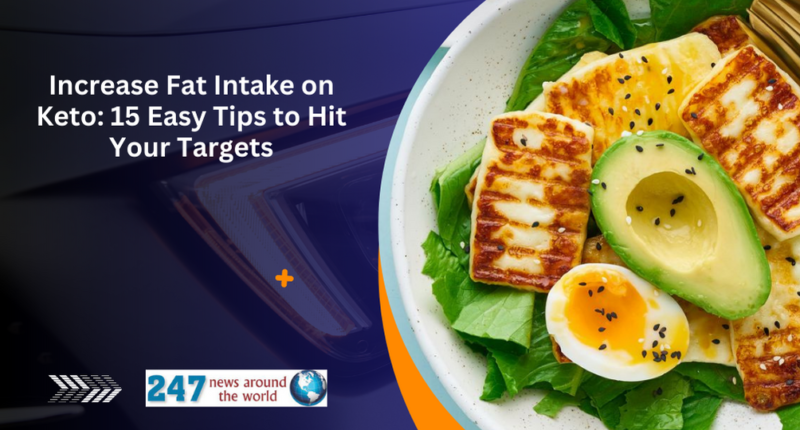A look at how to “Increase Fat Intake on Keto: 15 Easy Tips to Hit Your Targets” The ketogenic diet, or keto diet, is a popular low-carb, high-fat diet that has been proven effective for weight loss and overall health. When following a keto diet, it is crucial to maintain a high intake of healthy fats to achieve and sustain a state of ketosis. In this article, we will provide you with 15 easy tips to help you increase your fat intake while staying on track with your keto goals.
Understanding the Importance of Fat on the Keto Diet
On the keto diet, your primary source of energy comes from fats. When you restrict your carbohydrate intake, your body enters a state of ketosis, where it burns fat for fuel instead of carbohydrates. Consuming an adequate amount of fat is essential to maintain this state and support your overall health.

To increase fat intake on the keto diet, follow these easy tips:
Choose Healthy Sources of Fats
Not all fats are created equal, and it’s important to prioritize healthy fats on the keto diet. Opt for sources such as avocados, olive oil, coconut oil, nuts, and seeds. These fats are rich in essential nutrients and beneficial for your heart health.
Incorporate Avocados into Your Diet
Avocados are a fantastic source of healthy fats and are incredibly versatile. You can enjoy them sliced in salads, mashed as guacamole, or blended into smoothies. Avocados are also packed with fiber, which aids digestion and helps you stay satisfied.
Opt for Fatty Cuts of Meat
When selecting meat for your meals, opt for fatty cuts like chicken thighs, beef ribeye, or pork belly. These cuts are higher in fat content and can provide the necessary fuel for your body on a keto diet. Remember to choose organic, grass-fed, or pasture-raised options whenever possible for superior quality.
Cook with Healthy Oils
Cooking with healthy oils not only adds flavor to your meals but also increases your fat intake. Use oils like olive oil, coconut oil, and avocado oil in your cooking. These oils have a high smoke point and are stable at higher temperatures, making them suitable for various cooking methods.
Add Butter and Ghee to Your Meals
Butter and ghee are excellent sources of saturated fats and can be easily incorporated into your meals. They add richness and enhance the taste of your dishes. Spread some butter on your steamed vegetables or cook your eggs in ghee for a flavorful twist.
Enjoy Full-Fat Dairy Products
Full-fat dairy products like cheese, heavy cream, and Greek yogurt are great options to increase your fat intake. These products are low in carbohydrates and high in healthy fats. However, be mindful of portion sizes, as they can be calorie-dense.
Include Nuts and Seeds in Your Snacks
Nuts and seeds are excellent keto-friendly snacks that are rich in healthy fats. Almonds, walnuts, macadamia nuts, chia seeds, and flaxseeds are all great choices. Keep a stash of these nutrient-dense snacks with you for a quick and easy way to boost your fat intake throughout the day.
Use High-Fat Condiments and Sauces
Enhance the flavor of your meals while increasing your fat intake by using high-fat condiments and sauces. Mayonnaise, ranch dressing, and creamy salad dressings are great options that can be drizzled over salads or used as dips. These condiments not only add taste but also provide a good amount of healthy fats.
Make Homemade Fat Bombs
Fat bombs are delicious and convenient snacks that are specifically designed to be high in fat and low in carbohydrates. They are often made with ingredients like coconut oil, cocoa powder, nut butter, and stevia. You can find various recipes online and make a batch of fat bombs to have on hand whenever you need a quick fat boost.
Eat Fatty Fish Regularly
Fatty fish, such as salmon, mackerel, and sardines, are not only rich in omega-3 fatty acids but also provide a good amount of healthy fats. These fish can be grilled, baked, or pan-fried to create a tasty and nutritious meal. Including fatty fish in your diet regularly will help you meet your fat intake goals while benefiting from their numerous health advantages.
Make Use of Coconut Oil and MCT Oil
Coconut oil and MCT (medium-chain triglyceride) oil are highly recommended for those following a keto diet. These oils are quickly absorbed and converted into ketones, providing a readily available source of energy. Use coconut oil for cooking and baking, and consider adding MCT oil to your coffee or smoothies for an extra fat boost.
Incorporate Eggs into Your Meals
Eggs are a versatile and affordable source of healthy fats. They can be prepared in various ways, such as scrambled, boiled, or made into omelets. Including eggs in your meals not only increases your fat intake but also provides essential nutrients like choline and vitamin D.
Snack on Cheese and Olives
Cheese and olives are flavorful and satisfying snacks that are perfect for increasing your fat intake. Opt for full-fat cheese varieties like cheddar, mozzarella, or feta. Pair them with olives for a delicious combination of healthy fats and antioxidants.
Stay Hydrated and Watch Your Electrolyte Balance
Proper hydration is crucial on the keto diet. Drink plenty of water throughout the day to support your overall health and maintain optimal bodily functions. Additionally, since the keto diet can cause an imbalance in electrolytes, consider adding electrolyte-rich foods or supplements to your routine, such as avocados, leafy greens, and electrolyte powders.
What happens if you don’t get enough fat on keto?
If you don’t get enough fat on the keto diet, it can have several effects on your body and overall success with the diet. Here are some potential consequences of not consuming enough fat while following a ketogenic eating plan:

Difficulty Achieving or Maintaining Ketosis:
The primary goal of the keto diet is to enter a state of ketosis, where your body relies on fat as its main source of fuel instead of carbohydrates. If you don’t consume enough fat, your body may not have an adequate fuel source to sustain ketosis. This can make it harder to reach or maintain a state of ketosis, which is essential for the benefits associated with the diet, such as weight loss and improved energy levels.
Lack of Energy and Fatigue:
Fat is a concentrated source of energy, providing more calories per gram compared to carbohydrates and protein. When you don’t consume enough fat on the keto diet, you may experience a lack of energy and feelings of fatigue. This can impact your overall performance, productivity, and motivation.
Increased Hunger and Cravings:
Fat is highly satiating and helps to keep you feeling full and satisfied after meals. When you don’t consume enough fat, you may experience increased hunger and cravings, as your body seeks the energy it needs. This can make it challenging to stick to the keto diet and can lead to overeating or consuming foods that are not aligned with the diet’s principles.
Nutrient Deficiencies:
Healthy fats are a vital source of essential fatty acids and fat-soluble vitamins like vitamins A, D, E, and K. Insufficient fat intake can lead to deficiencies in these important nutrients, which play key roles in various bodily functions, including immune function, hormone production, and brain health.
Slower Weight Loss or Plateaus:
Consuming an adequate amount of fat is crucial for achieving weight loss on the keto diet. Fat provides a feeling of fullness, helps regulate appetite, and supports a sustainable calorie deficit. Without enough fat, your weight loss progress may slow down or reach a plateau, as your body may hold onto stored fat as a protective mechanism.
Negative Impact on Hormonal Balance:
Fat is essential for the production of hormones in the body. Inadequate fat intake can disrupt hormonal balance, potentially leading to issues like irregular menstrual cycles in women or hormonal imbalances in both men and women.
It’s important to note that the specific fat intake requirements can vary based on individual factors such as age, gender, activity level, and overall health. Working with a healthcare professional or registered dietitian who specializes in the keto diet can help determine the appropriate fat intake for your specific needs and goals. They can provide personalized guidance to ensure you’re getting enough fat while following the keto diet in a healthy and sustainable manner.
Best Foods High in Fat for the Keto Diet
The dirty and clean keto diets differ in terms of food quality. Prioritizing high-quality fats is the most effective way to handle the keto diet for healthy weight loss. You can do this by focusing on unsaturated fat sources and keeping saturated and trans fats to a minimum.
Here are some of the best good fats for keto and how much fat they contain per 100g:
- Avocado: 14.7g
- Butter: 81.1g
- Coconut: 33.5g
- Olives: 15.3g
- Eggs: 9.51g
- Sardines: 11.4g
- Smoked salmon: 4.32g
- Olive oil: 100g
- Goat cheese: 29.8g
- Walnuts: 65.2g
A Word From a Nutritionist
As a nutritionist, it’s crucial to emphasize the importance of getting enough fat while following the keto diet. Fat plays a significant role in supporting overall health and achieving the desired outcomes of the ketogenic eating plan. Here are a few key points to consider:
Energy Source:
Fat is a primary energy source on the keto diet. By consuming sufficient fat, you provide your body with the fuel it needs to function optimally. It helps sustain energy levels throughout the day, supports physical activity, and aids in the proper functioning of vital organs.
Nutrient Absorption:
Certain vitamins and minerals are fat-soluble, meaning they require dietary fat to be properly absorbed by the body. Without enough fat, the absorption of these essential nutrients may be compromised, leading to potential deficiencies. Incorporating healthy fats ensures that you can adequately absorb and utilize these vital nutrients.
Satiety and Appetite Control:
Fat is highly satiating, meaning it keeps you feeling full and satisfied after meals. It helps control hunger and cravings, reducing the likelihood of overeating or reaching for unhealthy snacks. By including enough fat in your meals, you promote feelings of fullness and support portion control.
Hormone Production:
Fats are essential for the production of hormones in the body. Hormones play a vital role in various bodily functions, including metabolism, mood regulation, and reproductive health. Consuming adequate healthy fats supports the production and balance of these crucial hormones.
Ketosis Maintenance:
To achieve and maintain a state of ketosis, where your body efficiently burns fat for energy, it’s important to provide an adequate supply of dietary fat. Without enough fat, your body may start breaking down muscle tissue for fuel, hindering your progress and potentially leading to muscle loss.
Long-Term Sustainability:
The keto diet is most effective when it is sustainable and can be followed in the long term. Adequate fat intake ensures that you’re receiving the necessary calories and nutrients to support your overall well-being. It also enhances the palatability and enjoyment of meals, making it easier to adhere to the diet in the long run.
Remember, it’s essential to choose healthy sources of fat such as avocados, nuts, seeds, olive oil, and fatty fish. Avoid excessive consumption of unhealthy fats, such as those found in processed and fried foods. Strive for a well-rounded diet that includes a variety of nutrient-dense foods to support your overall health and well-being while following the keto diet.
Always consult with a healthcare professional or registered dietitian who can provide personalized guidance based on your specific needs and goals. They can help you determine the appropriate fat intake and ensure that your keto diet is balanced, sustainable, and aligned with your overall health objectives.
Conclusion
Increasing your fat intake on the keto diet is essential to maintain ketosis and support your health goals. By incorporating healthy fats from sources like avocados, nuts, seeds, fatty cuts of meat, and oils, you can easily hit your fat targets while enjoying a wide range of delicious meals and snacks. Remember to prioritize nutrient-dense options and stay mindful of portion sizes to ensure you are meeting your individual dietary needs.
FAQs (Frequently Asked Questions)
Q: Can I follow the keto diet without increasing my fat intake?
While it’s important to prioritize healthy fats on the keto diet, it’s also essential to maintain a balanced approach to nutrition. Consult with a healthcare professional or registered dietitian to determine the best approach for your specific needs and goals.
Q: How much fat should you consume on a keto diet?
The recommended fat intake on a keto diet varies depending on factors such as your caloric needs, body composition, and individual goals. Generally, it is advised to consume 70-75% of your daily calories from fat. However, it’s best to consult with a healthcare professional or registered dietitian to determine the appropriate fat intake for you.
Q: Are all fats allowed on the keto diet?
While fats are a significant component of the keto diet, it’s important to focus on healthy sources of fats. Opt for foods rich in monounsaturated fats, polyunsaturated fats, and saturated fats from natural sources like avocados, nuts, seeds, and fatty fish. Avoid trans fats and highly processed fats found in fried and packaged foods.
Q: Can I still lose weight if I increase my fat intake?
Yes, you can still lose weight while increasing your fat intake on a keto diet. Remember that the primary objective of the keto diet is to shift your body into a state of ketosis, where it burns fat for fuel. By maintaining a calorie deficit and consuming healthy fats, you can achieve weight loss while enjoying the benefits of ketosis.
Q: Are there any risks associated with increasing fat intake on the keto diet?
While the keto diet can be effective for weight loss and other health benefits, it’s essential to monitor your overall dietary balance. Consuming excessive amounts of unhealthy fats or neglecting other essential nutrients can have negative health implications. Be mindful of your food choices, maintain a varied and balanced diet, and consider consulting a healthcare professional before starting any new diet.







